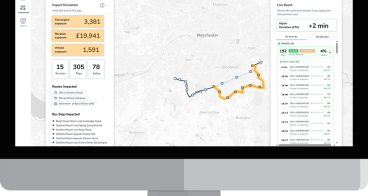Research project - Resilience of intermodal public transport networks
Background
Description
The attractiveness of public transport networks depends to a large extent on maintaining the targeted availability of the service. The various networks are differently prone to delays due to operational and non-operational causes. In particular, track-guided modes of transport such as trams and suburban trains can hardly react to events in the route network by flexing evasive action or spontaneous route changes. In addition to trip cancellations and other restrictions, traffic jams often build up in the transport networks, which can affect operations for several hours even after the original disruption has been rectified. One reason for such often large-scale impairments is the complexity of public transport networks, in which a large number of sub-components such as e.g. B. different modes of transport, the network structure, customer needs, timetable design and incident management interact and interact. Depending on the location and type, even small disturbances can have significant consequences for the entire system. The underlying spread of such disruptions, which is often not immediately recognizable, makes it difficult, especially for unforeseeable events in the context of incident management, to find optimal measures or even precisely identify the causes.
Objective
The focus of the project is the development of a flexible simulation model for evaluating and improving the resilience of public transport networks against operational disruptions. The modeling should integrate different modes of transport (including demand-oriented individual modes of transport such as sharing offers), take into account different types of operational incidents and map realistic measures against incidents.
Published on 09 August 2022. Note: This opportunity refers to contract notice "2022/S 131-373805" on TED. The original description is published in German.






